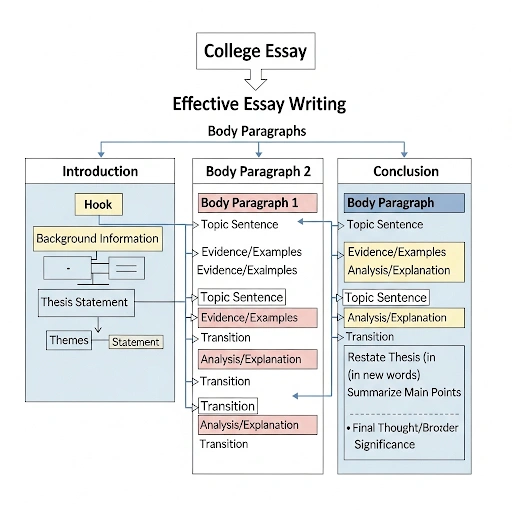College essays are often seen as the cornerstone of academic success, a chance to showcase your understanding, critical thinking, and persuasive abilities through effective college essay writing. Yet, for many students, the blank page can feel like an insurmountable barrier, making early experiences with college essay writing intimidating. Whether you’re a freshman tackling your first paper or a senior refining your argumentation, mastering college essay writing is a vital skill that goes far beyond the classroom. This comprehensive guide focuses on actionable strategies and college tips to help you practice college essay writing consistently, allowing you to craft A+ essays that impress professors and communicate your ideas with clarity and confidence.
In college, essays move beyond simple summaries to demand nuanced analysis, strong argumentation, and rigorous research, making college essay writing an essential skill. This shift requires mastering techniques central to college essay writing, from developing a compelling thesis to structuring complex arguments and citing sources accurately. With consistent practice in college essay writing and applying effective strategies, any student can elevate their work to meet higher academic standards. By embracing proven methods of college essay writing, you can unlock your full potential and make your academic journey smoother and more successful.
- What is College Essay Writing?
- Why A+ Essays Matter: Benefits for College Students
- How to Write A+ Essays: Core Features & Effective Strategies
- Sarah’s Journey to A+ Essays
- Common Mistakes to Avoid in College Essay Writing
- Expert Tips and Best Practices for College Essay Writing Success
- FAQ Section
- Conclusion
What is College Essay Writing?
College essay writing is a multifaceted academic endeavor that goes beyond simply stringing words together. Effective college essay writing involves constructing well-reasoned arguments, analyzing complex texts, and synthesizing information from various sources. Mastering college essay writing also means presenting your ideas in a clear, coherent, and persuasive manner. Unlike high school essays, which focus mainly on comprehension, advanced college essay writing requires deeper critical engagement with the subject matter.
In college, you’ll encounter various types of essays, each with its own conventions and goals:
- Argumentative Essays: Present a clear thesis statement and support it with evidence and logical reasoning, often refuting counterarguments.
- Expository Essays: Explain a topic, concept, or process clearly and concisely, relying on factual information and structured analysis.
- Analytical Essays: Break down a subject (e.g., a literary work, a historical event, a scientific theory) into its components and examine how they work together.
- Research Papers: Involve extensive research, synthesis of external sources, and adherence to specific citation styles (MLA, APA, Chicago).
- Personal Essays/Narratives: While less common in academic courses, these can appear in creative writing or reflective assignments, drawing on personal experiences to illustrate a broader point.
The relevance of strong college essay writing skills extends far into 2025 and beyond. In an increasingly interconnected and information-saturated world, mastering college essay writing helps you articulate complex ideas, synthesize diverse information, and persuade any audience effectively. From drafting compelling business proposals to producing clear scientific reports or crafting persuasive legal arguments, the techniques developed through consistent college essay writing are valuable across professional fields. Future trends highlight critical thinking, communication, and adaptability – all skills further strengthened through focused college essay writing.

Why A+ Essays Matter: Benefits for College Students
Achieving A+ grades on your college essays isn’t just about scoring well; it’s about developing essential skills that will benefit your entire academic career and future professional life. Here’s why excelling in essay writing is incredibly important:
- Demonstrates Critical Thinking: A top-tier essay isn’t just about what you know, but how you analyze, interpret, and connect ideas. It shows professors you can think deeply and independently, going beyond surface-level understanding.
- Enhances Communication Skills: Clear, concise, and persuasive writing is a hallmark of effective communication. Mastering essays improves your ability to articulate complex thoughts, structure arguments logically, and convey your message effectively to any audience.
- Boosts Academic Performance Across Disciplines: Essay writing is a universal skill required in almost every college course, from humanities to sciences. Strong writing skills translate to better performance in exams, research projects, and even presentations, providing significant college tips for overall academic success.
- Prepares for Professional Success: Regardless of your chosen career path, the ability to write clearly, concisely, and persuasively is invaluable. Whether it’s drafting reports, crafting emails, preparing presentations, or writing grant proposals, the skills honed in essay writing are directly transferable to the professional world.
- Develops Research and Information Synthesis Skills: College essays often require extensive research. Through this process, you learn to identify credible sources, evaluate information critically, synthesize diverse perspectives, and cite correctly – essential skills in today’s information age.
- Builds Confidence: Successfully tackling challenging writing assignments and receiving positive feedback can significantly boost your academic confidence. This self-assurance empowers you to take on more complex tasks and excel in your studies. For further reading on navigating complex challenges and ensuring your digital security, you might find this article on privacy tools helpful, as it relates to managing information in a complex world: https://www.privacytools.io/.
How to Write A+ Essays: Core Features & Effective Strategies
Writing an A+ essay isn’t a mystical art; it’s a systematic process that combines strategic planning, effective execution, and meticulous revision. Here are the core features and strategies to master for exceptional essay writing:
1. Deconstruct the Prompt
- Understand Keywords: Identify directive words (e.g., “analyze,” “compare,” “evaluate,” “discuss”), subject matter, and scope limitations.
- Identify Underlying Questions: Often, prompts imply questions you need to answer. Unpack these to ensure you’re addressing every component.
- Clarify Ambiguities: If anything is unclear, ask your professor for clarification. Don’t guess.
2. Develop a Strong Thesis Statement
- Arguable and Specific: Your thesis should be a clear, concise, and arguable statement that presents your main argument. Avoid vague or factual statements.
- Roadmap for Your Essay: A strong thesis not only states your position but also often hints at the main points you’ll use to support it.
- Evolve Your Thesis: Your initial thesis might change as you research and write. Be open to refining it as your understanding deepens.
3. Conduct Thorough Research
- Utilize Academic Databases: Go beyond Google. Use your college library’s databases (JSTOR, EBSCOhost, etc.) for credible, peer-reviewed sources.
- Evaluate Sources Critically: Consider the author’s credibility, publication date, objectivity, and relevance to your topic.
- Take Effective Notes: As you read, actively take notes, summarizing key ideas, direct quotes, and your own reflections. Always record citation information immediately.
4. Structure Your Argument (Outline is Key!)
- Introduction: Hook, background, and thesis statement.
- Body Paragraphs: Each paragraph should have a clear topic sentence, supporting evidence (quotes, data, examples), analysis explaining how the evidence supports your point, and a concluding sentence transitioning to the next paragraph. Aim for depth, not just breadth.
- Conclusion: Restate thesis in new words, summarize main points (without introducing new information), and offer a final thought or implication.
5. Master Evidence Integration and Analysis
- Integrate, Don’t Just Drop: Seamlessly weave quotes and data into your own sentences. Avoid “quote bombs.”
- Analyze, Don’t Just Summarize: Explain *how* your evidence supports your claims. This is where you demonstrate critical thinking, not just reporting. Ask “So what?” and “Why does this matter?” after presenting evidence.
- Cite Correctly: Adhere strictly to the required citation style (MLA, APA, Chicago). Inaccurate citations can lead to plagiarism issues.

Sarah’s Journey to A+ Essays
sisipkan keyword “college essay writing” di bagian sini minimal 4 keyword dan tambahkan di setiap bait tidak menggunakan font bold tidak menambahkan total kata nya dan buatkan lebih natural agar nyaman dibaca, tidak membuat bacaan terasa kaku. dan buatkan variasi di keywordnya dan jangan terlalu panjang (Let’s follow Sarah, a sophomore who, like many, struggled with college essay writing during her freshman year. Her early attempts at college essay writing often received B’s and C’s, with feedback showing her essays lacked depth or clarity. Determined to improve, Sarah adopted targeted college essay writing strategies, transforming her frustrations into tangible progress. With steady effort and practical guidance, her college essay writing skills grew stronger, boosting both her confidence and academic performance.)
Sarah’s first significant change in college essay writing was how she approached each prompt. Instead of skimming, she spent 20-30 minutes carefully deconstructing the prompt, a crucial step in effective college essay writing. She highlighted directive words, circled key terms, and wrote down the specific questions she needed to answer, improving her focus. For her history paper on the causes of the American Revolution, she realized the prompt required analysis, not just description, refining her approach to college essay writing. By adopting this method consistently, her college essay writing became more precise and purposeful.
Next, Sarah concentrated on her thesis, a key step in successful college essay writing. Instead of beginning with a broad idea, she waited until her preliminary research was complete, strengthening her college essay writing approach. She drafted a specific, arguable thesis: “While economic grievances provided the initial impetus for the American Revolution, it was the evolving Enlightenment ideals of liberty and self-governance that fundamentally solidified colonial resolve for independence,” refining her college essay writing skills. By focusing on clarity and precision, her college essay writing gained direction and impact.
Sarah dramatically improved her research habits. Instead of just using Wikipedia, she dove deep into her university’s library databases. She learned to use advanced search filters and spent time understanding how to evaluate the credibility of historical journals. She diligently kept track of every source, even creating a simple bibliography as she went.
The biggest game-changer for Sarah was outlining. For her literature essay on symbolism in *The Great Gatsby*, she created a detailed outline, allocating a specific page count to each body paragraph and jotting down the key evidence and analysis points for each. This ensured her essay had a logical flow and that each paragraph contributed directly to her thesis. She also started integrating evidence more effectively, using phrases like “As scholar X argues…” or “This historical data suggests that…”
Finally, Sarah embraced the revision process. Instead of just spell-checking, she read her essays aloud to catch awkward phrasing, asked a peer to review for clarity, and utilized her university’s writing center. She paid close attention to grammatical errors and stylistic improvements, understanding that presentation matters as much as content for an A+.
By applying these strategies, Sarah saw her grades steadily climb. Her history paper received an A-, and her literature essay earned a solid A. She realized that excellence in essay writing was a learnable skill, not an innate talent, and that consistent effort with the right college tips could yield impressive results.

Common Mistakes to Avoid in College Essay Writing
While striving for excellence, it’s equally important to be aware of common pitfalls that can derail your essay writing efforts. Avoiding these mistakes is a key college tip for success:
- Misunderstanding the Prompt: The most common and damaging mistake. Failing to fully grasp what the prompt is asking for means you’ll write an essay that doesn’t answer the question, regardless of its quality. Always deconstruct the prompt before writing.
- Weak or Absent Thesis Statement: An essay without a clear, arguable thesis lacks direction and purpose. It becomes a summary or a collection of facts rather than a persuasive argument.
- Lack of Evidence or Reliance on Personal Opinion: College essays require academic support. Relying solely on your opinion or vague generalizations without concrete evidence (quotes, data, examples from credible sources) will weaken your argument.
- Poor Evidence Integration (Quote Bombing): Simply dropping quotes into your text without proper introduction or analysis. Evidence needs to be seamlessly integrated and followed by thorough explanation of its relevance.
- Insufficient Analysis: This is a major differentiator between good and excellent essays. Don’t just present evidence; *analyze* it. Explain its significance, its implications, and how it directly supports your thesis.
- Lack of Structure/Disorganization: Essays that jump between ideas or lack clear paragraph transitions confuse the reader. A strong outline and logical flow are paramount.
- Plagiarism: Whether intentional or accidental (due to improper citation), plagiarism is a severe academic offense. Always cite your sources meticulously and understand what constitutes plagiarism.
- Grammar, Spelling, and Punctuation Errors: While content is king, a poorly edited essay undermines your credibility. Proofread diligently, use grammar checkers, and ideally, have someone else review your work.
- Procrastination: Leaving essays until the last minute severely limits time for research, critical thinking, drafting, and revision – all crucial steps for an A+ paper.
Expert Tips and Best Practices for College Essay Writing Success
Beyond avoiding common mistakes, incorporating these expert college tips and best practices will elevate your essay writing to the next level:
- Start Early, Outline Diligently: “The best essays are written in stages, not in one sitting,” advises Dr. Elena Rodriguez, a professor of English Literature. “A detailed outline is your blueprint; it saves you countless hours of disorganized writing and rewriting.” Break down the writing process into manageable chunks: prompt analysis, research, outlining, drafting, and revision.
- Utilize Your University’s Writing Center: Almost every college has a writing center staffed by experienced tutors. These centers offer invaluable feedback on everything from thesis development to citation and grammar. It’s a free resource designed to help you improve.
- Read Exemplary Essays: Ask your professors for examples of A-level essays from previous semesters (if permissible). Analyzing strong essays in your discipline will help you understand the conventions, depth of analysis, and argumentation styles expected.
- Develop a Unique Voice (Within Academic Tone): While academic writing requires formality, it doesn’t mean being bland. As you gain confidence, develop your own clear, concise, and engaging writing style.
- Peer Review Effectively: Exchange essays with a classmate. Provide constructive criticism and be open to receiving it. Focus on clarity, argument strength, evidence use, and organization, not just grammar.
- Revise, Revise, Revise: Revision is where essays truly transform. Beyond proofreading, focus on revising content, organization, clarity, and conciseness. Cut redundant words, strengthen weak arguments, and ensure smooth transitions. Read your essay aloud to catch awkward phrasing.
- Learn from Feedback: Pay close attention to your professor’s comments on graded essays. They highlight areas for improvement. Don’t just look at the grade; understand the feedback and apply it to your next assignment.
- Understand Citation Styles Deeply: Don’t just rely on citation generators. Understand the principles of MLA, APA, or Chicago style. This knowledge helps you troubleshoot issues and ensures academic integrity.
- Break Down Research into Manageable Chunks: For longer research papers, don’t try to gather all your sources at once. Research iteratively, allowing your understanding and thesis to evolve as you discover new information.
- Practice Active Reading: When reading texts for your essays, don’t just passively consume them. Annotate, highlight, summarize paragraphs in your own words, and identify key arguments and evidence. This makes it easier to draw upon sources later.
- Prioritize Rest and Well-being: Burnout can severely impact writing quality. Ensure you get enough sleep, take regular breaks, and manage stress. A fresh mind is a productive mind when it comes to essay writing.
FAQ Section
Q: How can I come up with a strong thesis statement?
A: A strong thesis statement should be arguable, specific, and provide a clear roadmap for your essay. Start by brainstorming your main argument or the answer to your prompt. Then, refine it to be concise and take a clear stance. It often helps to include the main points you’ll use to support your argument within the thesis itself or immediately following it.
Q: How do I avoid plagiarism, especially accidental plagiarism?
A: To avoid plagiarism, always cite your sources correctly, even when paraphrasing ideas. When directly quoting, use quotation marks and cite. When summarizing or paraphrasing, put the ideas entirely in your own words and still cite the original source. Take meticulous notes during research, clearly distinguishing between your own thoughts and information from sources. If in doubt, cite it!
Q: What’s the best way to structure an essay effectively?
A: A common and effective structure includes an introduction (hook, background, thesis), several body paragraphs (each with a topic sentence, evidence, analysis, and transition), and a conclusion (restating thesis, summarizing main points, final thought). Use outlines to plan your essay’s structure before you start writing to ensure logical flow and coherence.
Q: How much research is enough for a college essay?
A: The amount of research needed varies by assignment length and complexity. Generally, you need enough credible sources to fully support every claim in your thesis and body paragraphs. Aim for quality over quantity. Focus on academic databases and peer-reviewed articles, and ensure your research covers multiple perspectives on your topic. Always prioritize understanding the sources deeply over just collecting many of them.
Q: How important are grammar and spelling in an A+ essay?
A: Grammar, spelling, and punctuation are extremely important. While they are not the sole determinants of an A+ grade, errors can significantly undermine your credibility and distract from your argument. Professors expect polished, error-free writing at the college level. Always proofread meticulously, use grammar checkers, and consider visiting your university’s writing center for an extra review.
Q: Should I use a formal or conversational tone in college essays?
A: For most academic essays, a formal and objective tone is expected. Avoid slang, contractions, overly casual language, and first-person pronouns (“I,” “my”) unless specifically permitted by your professor or assignment. The goal is to present a well-reasoned argument supported by evidence, maintaining academic rigor and credibility.
Q: What’s the best strategy for overcoming writer’s block?
A: Writer’s block often stems from trying to perfect everything at once. Try these college tips: start with an outline (don’t try to write perfect sentences yet), free-write for 10-15 minutes to get ideas flowing, work on a different section of the essay, take a short break, or simply write a “shitty first draft” with the understanding that you’ll revise heavily later. Don’t aim for perfection in the initial draft.
Conclusion
Crafting A+ essays in college through consistent college essay writing is an achievable goal for any student willing to understand the process and refine their skills. Success in college essay writing isn’t about being a “natural writer,” but about carefully deconstructing prompts, developing strong thesis statements, conducting thorough research, structuring arguments logically, integrating evidence effectively, and embracing the revision phase. By committing to regular practice and applying these college tips, students can transform their approach, making their academic work not only exemplary but also a clear reflection of their critical thinking and intellectual growth, demonstrating the full benefits of disciplined college essay writing.
Remember, every essay is an opportunity to sharpen your critical thinking and communication skills – assets that will serve you throughout your academic journey and well into your professional life. Don’t view writing as a chore, but as a chance to express your ideas with clarity and impact. Start implementing these strategies today and witness your essay grades soar, unlocking new levels of academic success. For further insights into managing information and securing your digital presence, which echoes the importance of careful data handling in academic research, explore this article: Thread 1.4 Timeline 2025.
To continue your journey into cloud security, consider the in-depth resources from the Cloud Security Alliance (CSA), a leading authority on cloud best practices. For practical guides, check out our posts on building a secure digital toolkit.
For additional high-authority insights on research, productivity, and academic strategies, explore Wired, Statista, and Google Scholar.
